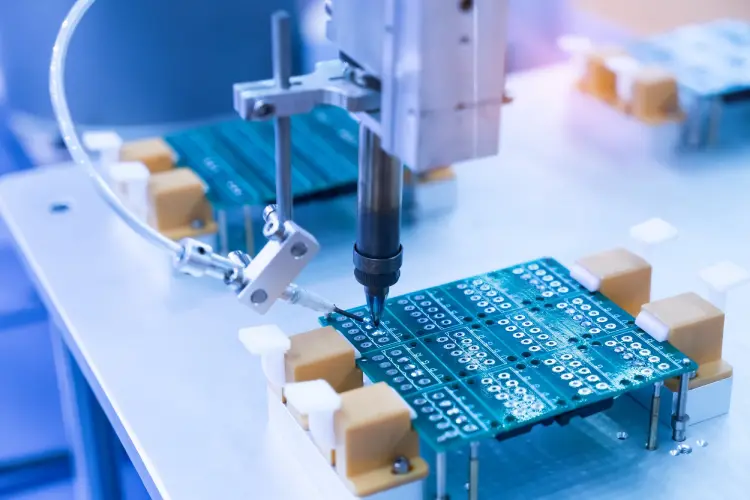
Pressure is mounting on the US government to intervene in the economically and geopolitically pivotal semi-conductor business this week, with Google and Microsoft voicing their opposition to Nvidia’s Arm takeover, and a coalition of US chipmakers calling on President Biden to provide more assistance to the industry.

Google, Microsoft and rival chipmaker Qualcomm are among the companies to have voiced their opposition to the Nvidia-Arm deal, according to Bloomberg, after the Federal Trade Commission opened an investigation into the $40bn deal, announced last September.
UK-based Arm has built its business on being vendor-agnostic, licensing its designs to companies that use them in their products, or as the basis for their own chipsets. Arm designs already dominate the mobile market, and are increasingly popular for PCs and servers. Apple recently announced its M1 processor, based on an Arm-based architecture, that will feature in the next generation of Macbooks.
Nvidia insists that Arm’s licensing model will retain its independence. But Qualcomm, which produces products including the Arm-based Snapdragon range of mobile chips, is understandably nervous, as it invested in Arm’s continued neutrality.
Previously the world’s leading producer of smartphone chipsets, Qualcomm lost the top spot to Taiwanese challenger Mediatek last year, according to figures from tech researchers Counterpoint, but retained a 29% share of the market in Q3 of 2020. Sales of mobile handset chips were worth $4.22bn to Qualcomm in the three months to December 2020, more than half the company’s total revenue for that period ($8.23bn).
Neither Microsoft nor Alphabet, Google’s parent company, are currently active in the chip market, but both are keen to follow Apple’s lead and launch their own silicon. Google is reported to be working on a chipset, codenamed Whitechapel, which would be Arm-based and manufactured using Samsung’s next-generation 5nm technology. This will initially be used in the company’s Pixel phones, according to reports, with later versions appearing in Chromebook laptops. Microsoft is also developing an Arm-based processor, but with a focus on powering its Azure cloud servers, which currently rely on chips from Intel.
[Keep up with Tech Monitor: Subscribe to our weekly newsletter]
This sustained opposition to Nvidia’s Arm takeover may convince the FTC to block the deal. Even if not, it still has many hurdles to clear. As previously reported by Tech Monitor, the UK Competitions and Markets Authority is investigating the acquisition, and further regulatory scrutiny, particularly from China, is likely to follow.
Chipmakers demand US government support
Meanwhile, Nvidia and Qualcomm executives are among 21 chipmakers that signed a letter urging President Biden to prioritise funding for manufacturing and research and development to boost the industry in the US.
The letter, from the Semiconductor Industry Association (SIA), which claims to represent 98% of the US chip market by revenue, was also signed by outgoing Intel CEO Bob Swan and AMD boss Dr Lisa Su. It says state aid is needed to help US businesses maintain their leadership in the semiconductor space.
American companies took home 47% of global chip revenue in 2019, but are losing ground to the likes of China, which is growing its value-add in the silicon supply chain. The US share of the chip manufacturing market (as opposed to design) has decreased from 37% in 1990 to 12% in 2020.
“This is largely because the governments of our global competitors offer significant incentives and subsidies to attract new semiconductor manufacturing facilities, while the US does not,” the letter says. “Others have also increased R&D investment substantially, while the US investment in research has been relatively flat.”
China has been actively supporting its own semiconductor industry with a raft of policies introduced last summer. These were drawn up in response to increasingly strained relations with the US, and aim to make the Chinese silicon sector more self-sufficient. They include tax breaks for chipmakers and a reduction of import tariffs for certain components, as well as grants to fund R&D and more support for businesses trying to raise new finance.
US companies will be pinning their hopes on provisions for the industry which were originally set out in the CHIPS for America act that was subsequently rolled into the National Defense Authorization Act. This could deliver $15bn in state subsidies and incentives for semiconductor manufacturing, and $12bn for chip R&D. This passed both houses last year, and is now at committee stage where its budget will be set.
John Neuffer, SIA president and CEO, says a failure to back the bill with sufficient funds could risk the US being left behind when it comes to emerging technology such as artificial intelligence, 6G, and quantum computing. “By investing boldly in domestic semiconductor manufacturing incentives and research initiatives, President Biden and Congress can reinvigorate the US economy and job creation, strengthen national security and semiconductor supply chains, and ensure the US remains the leader in the game-changing technologies of today and tomorrow,” Neuffer says.
Ironically, the Biden administration may consider that, though unpopular, allowing Arm’s technological prowess to come under Nvidia’s control would be a useful step towards ensuring the semiconductor sector in the US has a bright future.






